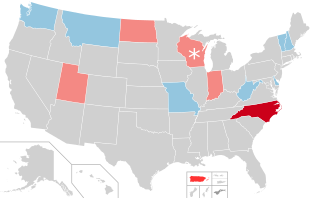
United States gubernatorial elections were held on November 2, 2004, in 11 states and two territories. There was no net gain in seats for either party, as Democrats picked up an open seat in Montana while defeating incumbent Craig Benson in New Hampshire, while Republicans defeated incumbent Joe Kernan in Indiana and won Missouri after Bob Holden lost in the primary. These elections coincided with the presidential election.

United States gubernatorial elections were held on November 4, 2008, in 11 states and two territories. Prior to the election, eight of the total seats were held by Democrats and five by Republicans. Two governors were prohibited by term limits from seeking re-election in 2008. The only governorship to change party was the open seat in Missouri, which was won by a Democrat after being previously held by a Republican.

The Democratic Governors Association (DGA) is a Washington, D.C.-based 527 organization founded in 1983, consisting of U.S. state and territorial governors affiliated with the Democratic Party. The mission of the organization is to provide party support to the election and re-election of Democratic gubernatorial candidates. The DGA's Republican counterpart is the Republican Governors Association. The DGA is not directly affiliated with the non-partisan National Governors Association. Meghan Meehan-Draper is currently the DGA's executive director, while Tim Walz is the current chair.

United States gubernatorial elections were held in four states. Kentucky and Mississippi held their general elections on November 4. Louisiana held the first round of its jungle primary on October 4 and the runoff on November 15. In addition, California held a recall election on October 7.

United States gubernatorial elections were held on November 7, 2000, in 11 states and two territories. The elections coincided with the presidential election. Democrats gained one seat by defeating an incumbent in West Virginia. As of 2024, this remains the last gubernatorial cycle in which a Democrat won in Indiana.

The Republican Party of Florida (RPOF) is the affiliate of the Republican Party in the U.S. state of Florida. Florida was dominated by the Democratic Party for most of its history. The Republican Party has rapidly gained ground in recent decades. It controls the majority of Florida's U.S. House seats, both U.S. Senate seats, the governorship, and has supermajorities in both houses of the state legislature.

The 2010 United States elections were held on Tuesday, November 2, 2010, in the middle of Democratic President Barack Obama's first term. Republicans ended unified Democratic control of Congress and the presidency by winning a majority in the House of Representatives and gained seats in the Senate despite Democrats holding Senate control.

United States gubernatorial elections were held in 12 states and two territories. Of the eight Democratic and four Republican seats contested, only that of North Carolina changed party hands, giving the Republicans a net gain of one governorship. These elections coincided with the presidential election on November 6, 2012. As of 2024, this marked the last time in which a Democrat won the governorship in Missouri and the last time in which a Republican won the governorship in North Carolina.

James Nicholas Ayers is an American political strategist and consultant who served as Chief of Staff to Vice President Mike Pence between July 2017 and January 2019. He had previously served as national chairman for Pence's vice-presidential campaign in 2016, and as the former executive director of the Republican Governors Association from 2007 to 2010.
Paul N. Bennecke, is an American political consultant for candidates of the Republican Party, and partner in the Atlanta-based public-affairs firm, Connect South. He is the former executive director of the Republican Governors Association (RGA). He was appointed to that position in December 2014 and ended his term on December 31, 2018. Previously he served as deputy executive director and political director of the RGA from January 2007 to January 2011 and led two US Senate campaigns for David Perdue.

The 2014 United States elections were held on Tuesday, November 4, 2014, in the middle of Democratic President Barack Obama's second term. Republicans retained control of the House of Representatives and won control of the Senate.

Phil Cox is an American long-time political operative, having served as the campaign manager or senior strategist to more than one hundred campaigns and super-pacs for Congress, Governor, U.S. Senate, and President. He is co-founder of 50 State, a bipartisan, state-focused government affairs firm, co-founder of GuidePostStrategies, a federal government affairs firm, Chairman of IMGE, a digital marketing firm, and partner at P2, a public affairs firm. He is a graduate of the University of Virginia, and lives in McLean, Virginia, with his wife and two children.

The 2014 Pennsylvania gubernatorial election was held on November 4, 2014, to elect the governor and lieutenant governor of Pennsylvania, concurrently with elections to the United States Senate in other states and elections to the United States House of Representatives and various state and local elections.

The 2018 United States elections were held on Tuesday, November 6, 2018. These midterm elections occurred during Incumbent Republican President Donald Trump's term. Although the Republican Party increased its majority in the Senate, unified Republican control of Congress and the White House was brought to an end when the Democratic Party won control of the House of Representatives in what was widely characterized as a "blue wave" election as Democrats also gained governorships and other state offices, and state legislative chambers as well.

United States gubernatorial elections were held on November 3, 2020, in 11 states and two territories. The previous gubernatorial elections for this group of states took place in 2016, except in New Hampshire and Vermont where governors only serve two-year terms. These two states elected their current governors in 2018. Nine state governors ran for reelection and all nine won, while Democrat Steve Bullock of Montana could not run again due to term limits and Republican Gary Herbert of Utah decided to retire at the end of his term.

United States gubernatorial elections were held on November 5, 2019, in Kentucky and Mississippi, and on October 12, 2019, with a runoff on November 16, in Louisiana. These elections formed part of the 2019 United States elections. The last regular gubernatorial elections for all three states were in 2015. The Democrats had to defend an incumbent in Louisiana, while the Republicans had to defend an incumbent in Kentucky plus an open seat in Mississippi. Though all three seats up were in typically Republican states, the election cycle became unexpectedly competitive: Kentucky and Louisiana were seen as highly contested races; and Mississippi's race ultimately became closer than usual, despite being seen as favorable for the Republicans.

United States gubernatorial elections were held on November 8, 2022, in 36 states and three territories. As most governors serve four-year terms, the last regular gubernatorial elections for all but two of the seats took place in the 2018 U.S. gubernatorial elections. The gubernatorial elections took place concurrently with several other federal, state, and local elections, as part of the 2022 midterm elections.

United States gubernatorial elections were held on November 2, 2021, in two states, New Jersey and Virginia, and a recall election was held in California on September 14. These elections form part of the 2021 United States elections. The last gubernatorial elections for New Jersey and Virginia were in 2017, and the last regular gubernatorial election for California was in 2018. Going into the elections, all three seats were held by Democrats.

The 2022 South Carolina gubernatorial election took place on November 8, 2022, to elect the governor of South Carolina. Incumbent Republican Governor Henry McMaster ran for re-election for a second full term in office and secured the Republican nomination in the June 14 primary. Joe Cunningham, former United States Representative from South Carolina's 1st congressional district, was the Democratic nominee. McMaster won the general election with 58% of the vote — a larger margin than in 2018.

United States gubernatorial elections are scheduled to be held on November 5, 2024, in 11 states and two territories. The previous gubernatorial elections for this group of states took place in 2020, except in New Hampshire and Vermont where governors only serve two-year terms and elected their governors in 2022. In addition to state gubernatorial elections, the territories of American Samoa and Puerto Rico will also hold elections for their governors.



















